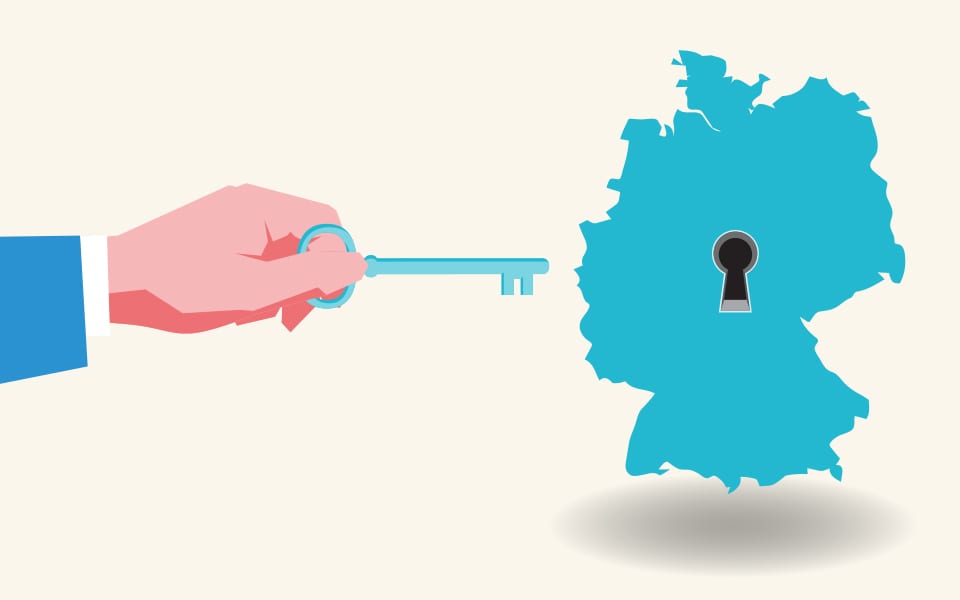Unlocking the German market requires a focus on demonstrating that your company adheres to the values the country is famous for – reliability and trustworthiness – almost as much as a keen price point. To expand in this key Eurozone market, you should also be able to challenge established supply chains.
The attractiveness of the German market to Irish business is evident in the numbers. It is the world’s fourth-largest economy and bilateral trade between the countries is worth around €39 billion annually. Germany is our third-largest tourist sector, and thanks to links in life sciences, medtech and biopharmaceuticals, Germany is our second-largest source of Foreign Direct Investment.
With a GDP growth rate of 1.6% in 2018, Germany has experienced nine years of continuous expansion of its economy and remains a stable option for companies planning to diversify markets.
Irish companies have a strong reputation in the German market
With historic trade and cultural links, breaking into the German market should not be seen as daunting, according to Deike Potzel, the German Ambassador to Ireland.
“Germany is very open to business to our friends in the European Union,” Her Excellency Ms. Potzel told delegates at Enterprise Ireland’s Ambition Germany conference. “Ireland has a really good reputation in Germany and the German market and I think Irish companies are in a very good position to take advantage of doing business in Germany.”
What should be your first steps, and how can you prepare for market entry?
Reliable market research is key, and Enterprise Ireland’s Market Discovery Fund has up to €150,000 available for companies to defray internal and external costs incurred when researching new markets for new or existing products and services.
As a mature market with well-established domestic and international suppliers, you will need to research it thoroughly to identify a niche. You will also need to assess competitors, both local and international.
If the German market is right for you, establishing the best route to market and understanding German business culture will help to avoid wasted sales efforts.
Working with a German distributor will get your product on the ground. But because the market is mature, your product may be competing with several similar offerings, and the largest distributors may have competing priorities for promotion.
While the price point of your product or service is important, in the German business landscape Preis-Leistungs-Verhältnis – value for money – includes demanding expectations for quality, certification and after-sales support.
“Once you have a German partner they are very loyal,” says Robert Byrne, director of Burnside Eurocyl, the Carlow-based hydraulic cylinder manufacturer, which has been supplying Germany for decades.
“But they expect you to deliver and to do what you say. Do that and you will have a customer for life.”
Calculate the cost of setting up in Germany
Personal contact is valued highly. While it is possible to sell online or have a virtual office, establishing an independent branch office, permanent establishment or fully fleshed-out GmbH (or limited company) will build the trust required by German partners. You can expect set-up costs to range between €1,000 to €4,000.
Germany is the world’s number one location for trade shows, and attending fairs for your sector demonstrates that you are serious about entering the market. Remaining highly visible at these events for 12-18 months is advisable.
Enterprise Ireland has supported companies to attend the world’s largest medical trade fair, Medica, last hosted in Düsseldorf and attracting 120,000 visitors, and EuroTier in Hannover, at which the theme for 2018 was digital animal farming, attracting 160,000 visitors.
“You may be surprised by how well thought of we are,” says Liam Ryan, managing director of SAP Labs Ireland, and a seasoned veteran of the German boardroom. “Germans admire our ability to get things done, our ability to recover and to pull together. This goes a long way with them.”
The German focus on attention to detail and delivery on promise can be serviced by thinking outside the box. As Byrne noted: “We don’t sell by sending a sales rep to a German customer. We sell by sending an engineer or a designer.”
Do this and you could find that, for your business, ‘Alles’ will be ‘in Ordnung.’
Learn more on doing business in Germany with our Going Global Germany guide.



